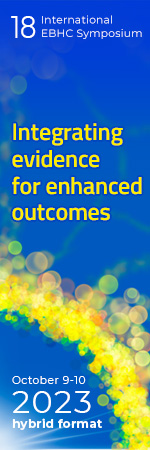 |
||
 
| ||
|
Activity
|
1st International EBHC Symposium 2006
"Priorities in Health Care" under the auspices of HTAi Society  Download EBHC Symposium 2006 Final Programme (430 kB) Download EBHC Symposium 2006 Final Programme (430 kB)Editions: 2006 | 2007 | 2008 | 2009 | 2010 | 2011 | 2012 | 2013 | 2014 | 2015 |
1st EBHC Symposium took place in Krakow of 2-3 October 2006, from the initiative of:
The leading theme of the Symposium was Evidence-Based Health Care (EBHC) - a health care system based on scientific evidence. Choice of the matter was the result of pressing need of changes in Polish health care system as well as evident evolution towards EBHC observed in health care systems of the neighbouring countries.
Schedule
First day - Monday, October 2nd, 2006
Second day - Tuesday, October 3rd, 2006
Speakers
Sessions
Screening and therapeutic programs
Prof. Sir Muir Gray; Jacek Grabowski, PhD, MD
Screening and therapeutic programs in highly developed countries, in which concept of EBHC (Evidence Based Health Care) is accepted, are estimated as to their efficacy and safety, costs and profitability as compared to alternative options. This estimation is performed prior to consent to implement a specific program and allocation of any means to it as well as some time after implementation. All screening programs must fulfill basic screening criteria, accepted worldwide. Both criteria of decision making and naming a screening program as well as British successes in the field will be presented by Sir Muir Gray – the EHBC “guru”, who introduced the term. Professor Sir Muir Gray is one of the most widely recognized experts worldwide and the guardian of rational expenditure of public means for screening programs in Great Britain. Polish experience in the field and proposed directions of change will also be presented. Benefit packages
Pedro Koch, PhD, MD; Waldemar Wierzba, PhD, MD; Krzysztof Łanda, MD
A benefit package is a selected set of medical services, procedures or interventions covered by health insurance of a specific kind. In this session principles of benefit packages creation will be discussed on example of countries, in which the packages constitute one of the basic tools of the health insurance system.
Among others, the following topics will be introduced:
Dr Pedro Koch will discuss more than 20 years of Swiss experience in this field. Possible directions of future systems and packages development will also be presented. Pedro Koch is one of the most experienced experts in Health Technology Assessment (HTA). He was responsible for quality approval of reimbursement applications in Switzerland. He also took part in reimbursement decision-making (on including drug and non-drug technologies into a package) as the Director of BSV.
Additional health insurance
Magdalena Władysiuk-Blicharz, MD, MBA; Mitchell Sugarman, MBA
Pia Schneider, PhD; Xenia Kruszewska, MD Additional insurance turns out to be an essential element of a well-developed medical services market. The market of voluntary supplementing and additional insurances in Poland is estimated at ca. 0.7 to 1.2 billion PLN, as compared to 36 billion PLN in the National Health Fund and 60 billion PLN in the whole health care system. Creation of a sufficiently large non-standard benefit package would open new area for supplementing and additional insurances, worth even 10-15 billion PLN per annum. In this session concepts and possibilities of development in such health insurance will be discussed and experience of other countries will be presented. Priorities in health care and analysis (including horizon scanning)
Prof. Jacek Ruszkowski, PhD, MD; Prof. Isabelle Durand-Zaleski
Milojka Novak, Pharm M; Alric Rüther, PhD, MD ore or less structured priority setting in health care means selection of medical services financed from public means and setting the order in which they will undergo prior analysis and/or standardization. In this session principles, means and experience concerning setting of priorities in health care and analysis will be presented. Influence of results of analyses as well as political factors on priority setting at different levels of the process will be discussed. Apart from results of efficacy and safety analyses or economic and financial analyses other factors, such as patients' preferences, social expectations and availability of infrastructure are taken into account in many countries. Estimation of their importance in selected countries will be presented. Setting of priorities in analysis is necessary, especially because of limited means that may be allocated to analyses before reimbursement decisions are made. That is why health technology assessment agencies worldwide perform so-called “horizon scanning” – monitoring new health technologies before they are registered or otherwise introduced into the system. Poland neither has its own “early warning” system nor takes part in any such international system for priority setting in health care. Standardization in medicine
Ales Bourek, PhD, MD; Ladislav Dusek, PhD, MD; Józef Stępień, MD
Tomasz Romańczyk, PhD, MD Standards and guidelines may be compared to road signs and lines, which regulate traffic and increase security on the road. Road signs and lines are most important in relatively dangerous parts of the road. Also standards and guidelines are created for these areas in medicine, which require systematization due to clinical, financial, legal or organizational considerations. Along with practice guidelines various standards concerning quality of products, equipment or management are introduced worldwide. Standardization in health care, including especially medical services and their conditions, became necessary and its role will grow along with increasng possibilities of diagnosis and treatment, better access to information and changes in the health care system. Standards in health care system are sometimes connected with each other; thus standardization requires careful coordination. Efficient implementation of standards requires commitment of all the parties involved – success is not possible without understanding between them. In this session Polish and foreign experience in creation and implementation of standards and guidelines will be discussed, as well as perspectives for their development in the health care system. Reimbursed drugs list
Peter Wieninger, MBA; Prof. Jacek Spławiński, PhD, MD
Bernhard Gibis, MPH, MD In this session model solutions and directions of change of drug reimbursement systems worldwide will be discussed. Not only the aims and principles of creation of reimbursed drugs lists, but also evolution of law and regulations concerning this problem in selected countries will be presented. In relation to general concept of EBHC role of transparent rules of reimbursement system function, ensuring health security of the society and optimal use of limited means ("value for money"), will be discussed. Polish experience and directions of planned changes in this field will also be discussed. Download
CEESTAHC Society prints:
|
|
| © Ceestahc.org Wykonała: Agencja A.R.T. Wy¶wietleń:9194, Data modyfikacji:2016-09-08 | ||



